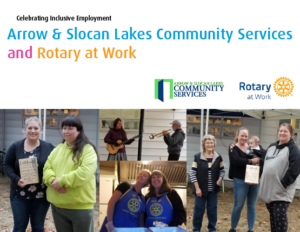Of working-age adults in Canada with intellectual and developmental disabilities (ages 20-64), only 31% are employed, compared to 79% of Canada’s general population in this age range.
– Statistics Canada, 2017
In British Columbia, Rotary at Work, along with community living organizations and other community partners are addressing this inequity, pushing for people labeled with intellectual and developmental disabilities to be included in the workforce in meaningful jobs of their choosing. One way that they are tackling the problem is by celebrating employers that are hiring people who have historically been excluded.
In a series of short interviews, our staff writer, Katie Miller, spoke with people around the province who have received funding from Inclusion BC to hold events to celebrate inclusive employment. We’ll be sharing their stories with you in the form of monthly blog posts.

On October 20th, 2022, Arrow & Slocan Lakes Community Services (ASLCS) and Rotary At Work put on an Employer Excellence Awards in Nakusp where Rotarians, employers, and support staff celebrated employers who are practicing inclusive employment and shared stories of success. Tania from ASLCS helped produce the event, and we got the chance to chat with her and learn about the event, her work, and the community she serves.
We discussed that having a job and being part of a community allows people to feel a sense of belonging: “…everyone can feel that they’re able to put their best foot forward and be able to contribute to society. That’s what I feel like everybody wants is to be able to feel like they’re providing something… [which] is a real confidence booster. I know starting even doing something small just absolutely just skyrockets your level of confidence.”
In Tania’s experience, the process of finding a good employment fit can take a little creativity and a growth mindset: “We try to match [job seekers] up with the skills that they have. Like we had one young lady who doesn’t read…but we got her a job at Home Hardware. She was able to match up the numbers on the products, so she worked two days a week just putting out (the) product…She made her own kind of little community in that workplace.”
Being in a more rural community can pose some logistical challenges for people that ASLCS supports: “For our folks, Castlegar has a problem with their bus system. I know my 2 diverse kids, they’ll never have a driver’s license, so they walk everywhere. Well, if we lived in Castlegar, the bus system doesn’t even help people get from one end of town to the other in a timely manner, let alone being a person with a diverse ability and trying to maneuver that. So, we all have our different challenges, small or big,” Tania pointed out.
Stay connected to read more! Sign up for our email newsletters


